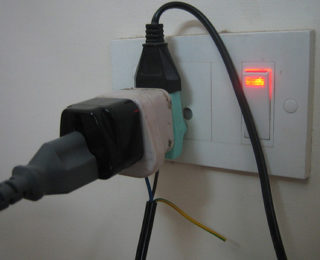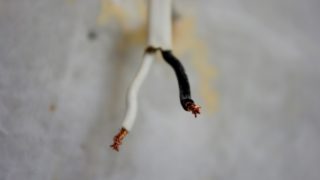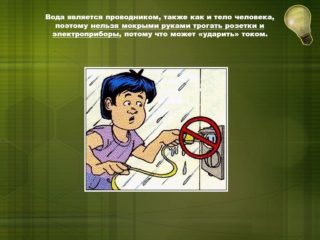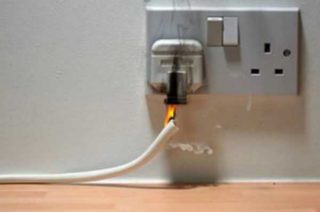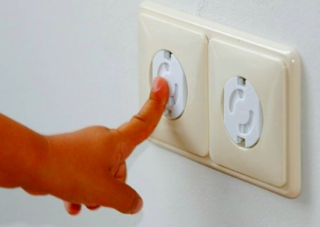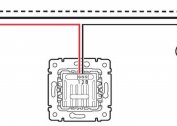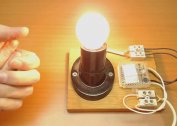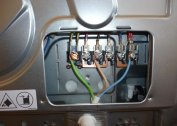The rules for using electrical appliances must be observed for safety. One wrong move - and the apartment can burn out, and a person can be shocked. Caution and attentiveness are the main conditions in contact with any type of household appliances and electricity in general.
Outlet Operation
The rules of conduct with electrical appliances state that the outlet is one of the most dangerous places in the house. It is not allowed to insert foreign objects into its connectors: metal, aluminum, wire residues. It is not necessary to connect several plugs from electrical appliances with one adapter to one plug-in device. This creates a large load on the power grid, the plugs begin to overheat, which may cause ignition.
In no case do not touch the outlet with wet hands: water conducts current. If there is a child in the house, all connectors of the plug-in device must be closed with special caps.
Bare wires
For safety, all wires in household appliances through which electricity flows are reliably insulated. But with prolonged use, there is a possibility of damage to the protective layer of plastic, rubber or rubber. Be sure to pay attention to the condition of the cables. If the contacts peep through the insulation at least a little, refuse to operate the device. Otherwise, you can get a strong electric shock, which will entail serious consequences.
Water and electrical appliances
Observe the rules for the safe use of electrical appliances: never wet your hands with plugs, switches, or the appliance body with wet hands. If an electrical breakdown occurs, serious injury could result. In a matter of seconds, a current pierces the human body through water. If at the same time you have to contact with water and kitchen appliances, it is better to periodically wipe your hands dry.
Do not contact with the appliance and water at the same time. For example, while in the bathroom, do not pick up a hairdryer or a phone on a charge when it is plugged in. When cleaning the house, try to turn off all electrical appliances, be sure to turn off the floor equipment while washing the floor. You can not keep one hand in the water, and the other try to start the microwave or washing machine.
Included Electrical Appliances
Any household appliances should be used only in the presence of a person. Even leaving the store, the owner runs the risk of being left homeless due to a fire. After ironing the clothes, it is imperative to turn off the iron and check that its hot sole does not come into contact with things. The electric stove turned on for a long time will start to overheat, which can cause ignition of the wiring.
If you notice that the washing machine has flowed, immediately unplug the appliance from the power supply. It is better to do this by putting on rubber gloves to avoid electric shock. You can also turn off the switch.
Rules for the use of electrical appliances in the home
 Any household appliances in the house require careful handling, especially if there is no voltage regulator. It is important to follow a few simple rules:
Any household appliances in the house require careful handling, especially if there is no voltage regulator. It is important to follow a few simple rules:
- Watching TV, heating a room with a fireplace, fan operation should always be controlled by the owner.Therefore, you can not fall asleep during the operation of electrical appliances.
- Do not wrap light bulbs in paper, cloth, or oilcloth. With prolonged use, they can provoke burning.
- Do not leave chargers from mobile phones and other battery equipment in a power outlet. With power surges, there is a high risk of current breakdown.
- If there are sufficiently powerful electric devices in the house or apartment, you must definitely connect them through the voltage regulator, which is inserted directly into the outlet.
- If possible, create a grounding: in a private house it is much easier to organize it.
Instructions for operating devices are prescribed in the instructions and manuals that come with any device. Observe them to protect yourself and your loved ones.
How to prevent a fire
The rules for the safe use of household appliances state that ignition can always be prevented.
- The presence of an unpleasant smell of burning plastic is an occasion to think. Perhaps somewhere “shorten" the wiring. Switch off the appliance immediately.
- The presence of extraneous noise: cracking, clicking also call on the owner to turn off the equipment.
- In case of accidental ingress of water, immediately disconnect the device from the power supply.
- No need to overload the mains. In the house no more than 5 devices should work simultaneously.
Following simple recommendations, you can notice the problem in time and eliminate the fire.
What to do if the appliance ignites
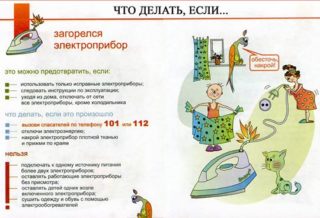 In order not to aggravate the situation and not cause a large-scale fire, it is necessary to observe the rules for using electric devices if they are in the burning stage.
In order not to aggravate the situation and not cause a large-scale fire, it is necessary to observe the rules for using electric devices if they are in the burning stage.
- Disconnect the device from the mains, and then start putting out the water. You can not do the opposite, since there is a high probability of getting an electric shock.
- If there is no water nearby, close the equipment with some thick blanket, it is better to use a blanket. This will stop the flow of oxygen to the flame, after which it will go out.
- If you can’t put out the fire on your own, you need to call the Ministry of Emergencies at 119, 911 or 101.
If a child is caught in a house and gets an electric shock, adults must call an ambulance to determine the degree of burns and injuries.
Injury prevention
To protect family members from careless handling of electricity, you just need to observe safety precautions.
- When there are children in the house, it is necessary to equip all sockets and adapters with special protective cases. They must be plastic or rubber.
- Any wiring should not be visible, so it is better to hide it in the baseboards or special boxes.
- If someone is still shocked, you must quickly put on a rubber glove or wrap a dry cloth around your hand and try to pull the victim away from the electrical appliance.
- If someone has taken up a bare wire, you must immediately disconnect the network.
- After the current has ceased to act on the body, a person needs to be put on a horizontal surface, covered with a blanket and called an ambulance.
Always refer to the instruction manual for electrical appliances and follow safety instructions. The health of people and the performance of household appliances depend on this.
